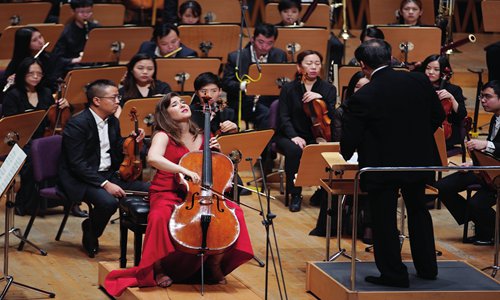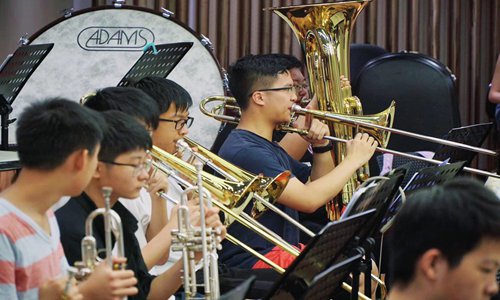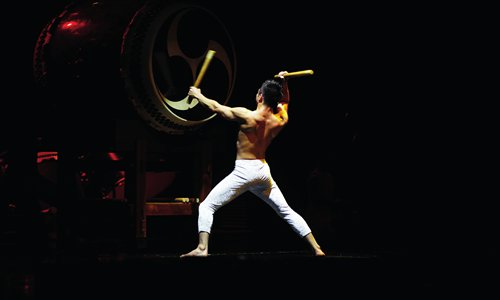HOME >> ARTS
Shanghai music festival entices young audiences with experimental performances
By Xu Liuliu in Shanghai Source:Global Times Published: 2019/7/17 19:58:10

US cellist Alisa Weilerstein makes her debut with the Shanghai Symphony Orchestra on Monday. Photo: Courtesy of the Shanghai Symphony Orchestra

Students rehearse for a performance during the Music in the Summer Air festival Photo: Courtesy of the Shanghai Symphony Orchestra

The Evolution taiko drumming performance Photo: Courtesy of the Shanghai Symphony Orchestra
Full of enthusiasm and passion, the music flows smoothly from the violin played by 30-something renowned violinist Ning Feng as he stands center stage in front of a full house.Ning put so much energy into playing the Violin Concert No.1 by Russian composer Prokofiev that the string on his bow was partially frayed through by the end, leaving on a lingering heavenly sound floating through the Shanghai Symphony Chamber Hall, designed by Japanese Pritzker winning architect Arata Isozaki.
Under the baton of conductor Yu Long, Ning, pianist Li Jian and US cellist Alisa Weilerstein staged an unforgettable concert with the Shanghai Symphony Orchestra (SSO) to close out the 10th Music in the Summer Air (MISA) festival on Monday night.
The young students that made up significant part of the audience were on their best behavior, not only did they know the music, but also the proper conduct in the hall, such as when to applaud, when to cheer and even when it was okay to cough.
It was for this wonderful audience that the organizers of the youth festival have held the event year after year.
"Our goal is to introduce classical music to young audiences in every way possible," Zhou Ping, president of the SSO, told the Global Times on Monday.
"We have managed to grab their attention with various events and crossover programs to allow more people to enjoy festival."
Active participation
The oldest and most influential orchestra in Asia, the 140-year-old SSO held its first summer festival a decade ago.
"We have done everything we can to allow young audiences to get to know us," Zhou said.
"MISA has always been a lab for musical crossover experiments: punk symphony, folk pop music, punk-rock organist performances as well as dialogues between Peking and Western opera, ping-pong and symphonies."
Two of these crossover experiments at this year's two-week-long festival were Evolution, a performance by Japanese taiko drumming troupe Kodo directed by Tamasaburo Bando, and theatrical work L'histoire du Soldat (The Soldier's Tale), narrated by tenor Warren Mok and performed by the Hong Kong Philharmonic Orchestra.
During MISA, young audiences are actively brought into the musical world through various means instead of being limited to passively watching performances - audience members can be volunteers and even performers on stage.
Zhou noted that in previous years, MISA has helped Shanghai students set up their own chamber orchestra, chorus, folk music ensemble and even a festival orchestra.
"We also had them try their hand at being music critics this year," she said.
Looking to the future
All in all, the orchestra has great hopes for these young students' future, as both audiences and musicians themselves.
Yu, the orchestra's artistic director as well as its conductor, talked about China's young and promising music talents earlier this year.
"Those [Chinese] musicians, especially composers, who are well-known in the West are mostly in their 60s, where are our younger composers?" he asked, going on to say that he looks forward to seeing more young Chinese composers take to international stages just as Zhou Tian and Du Yun once did.
In 2017, Zhou was nominated for a Grammy Award for his work Concerto for Orchestra; while Du won the 2017 Pulitzer Prize for Music with her opera Angel's Bone.
"I am encouraging young people to do things to achieve their ultimate goal. Musicians need to focus their minds on the music itself," Yu said, noting that he considers MISA the perfect platform to reach young people, especially in the live streaming era.
Cooperating with Chinese streaming platforms like iQiyi, Tencent Video and Youku, the music festival streamed 18 performances to 7.8 million viewers this year.
Shanghai Conservatory of Music professor Sun Guozhong commented that the festival has grown into an important part of summer life for people in Shanghai.
Over the years, the festival has established a lasting musical legacy in the city through commissioned works. One of these, Ricochet (Ping-Pong Concerto) by Andy Akiho, made its debut at the 2015 MISA, which turned out to be a blockbuster success.
"No one could have expected that classical music could work so well with the sport of ping-pong," recalled Zhou.
"The work has been viewed more than 3 million times on [classical music video platform] Medici and 4 million times on YouTube, a rare success for a classic music video."
The festival went even further in 2018 when it performed the music for classic Chinese animated film Secrets of the Heavenly Book during a screening of the film.
East meets West
The Monday night performance, which also featured Mozart's Piano Concerto No. 23 in A major, Prokofiev: Violin Concert No.1 in D major and Dovorak: Cello Concerto in B minor and was Weilerstein's debut with the SSO, was a warm up for the orchestra's upcoming 140th anniversary world tour in August.
The SSO will tour to seven cities including Washington and Chicago in the US, Edinburgh and London in the UK and take part at top art festivals such as the Luceme Festival, Promenade Concert and Edinburgh International Festival.
Gateways, their first album after signing to classical music label Deutsche Grammophon, will also be performed during the tour. The album containing two works by composer Chen Qigang, as well as Rachmaninoff's vibrant Symphonic Dances and Kreisler's delightful Tambourin Chinois.
The album has been so well-received in the West that The Times gave it four stars out of five stars after its global release on June 28.
Newspaper headline: All ears
RELATED ARTICLES:
- BBC Symphony Orchestra to hit Beijing stage
- Original symphony "The Great Wall" makes debut in Beijing
- Kids greet 70th birthday of motherland with melodious symphony of glockenspiels
- San Francisco Symphony celebrates Spring Festival
- Beijing Symphony Orchestra kicks off Gateway to Music summer festival